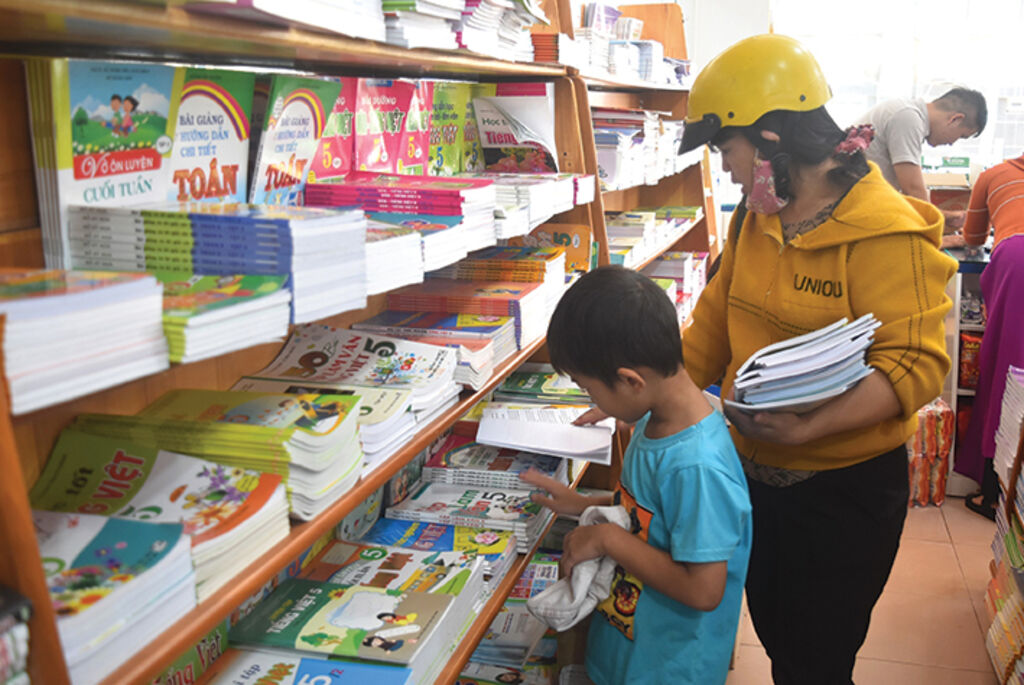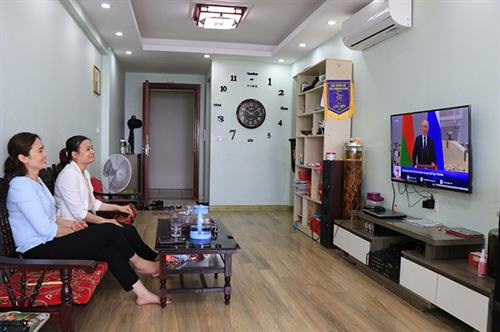 |
| A mother buys textbooks for her son__Photo: Nguyen Dung/VNA |
The Ministry of Education and Training (MOET) is seeking public opinions on a draft circular on choice of textbooks for use at general education institutions to replace Circular 25/2020/TT-BGDDT (Circular 25).
Under the draft, textbooks must be chosen on three principles:
Firstly, choice from the list of textbooks approved by the Minister of Education and Training.
Secondly, choice of one textbook for each subject or educational activity at each grade.
Thirdly, assurance of democracy, objectivity, openness and transparency in the choice of textbooks.
As per criteria for choice of textbooks, the draft underlines the suitability with local socio-economic characteristics and conformity with teaching and learning conditions of schools.
Compared to Circular 25, the draft contains a breakthrough policy on choice of textbooks.
Since the 2020-21 academic year, Vietnam has abolished state monopoly in textbook compilation, printing and distribution, following the adoption of the “one curriculum, various textbooks” policy under which publishing houses across the country are permitted to publish textbooks.
However, the appearance of multiple textbooks for each subject at each grade gave rise to another problem, i.e., how can textbooks be chosen?
The process of adopting textbooks for use at schools in a province or centrally run city under Circular 25 is as follows: First of all, subject teachers at every school in the locality discuss and evaluate available textbooks and then cast their votes to choose the most appropriate ones. Schools then report their choices to the provincial-level Education and Training Department for sum-up and submission to the Textbook Council, a 15-member council established by the provincial-level People’s Committee. The Council will review schools’ recommendations and vote to choose textbooks for use in the locality.
According to experts, the above process lacks transparency, objectivity and respect for opinions of schools and teachers. Though hundreds of schools with thousands of teachers are tasked to spend their time and efforts to choose textbooks, the final decision rests with just 15 members of the Council.
Moreover, as Circular 25 does not specify any vote percentage as a threshold for a textbook to be chosen by the Council, many teachers and schools feel their opinions are not valued and respected.
Once the draft circular is approved, the above situation will be remedied. Under the draft, Textbook Councils would no longer be set up at the provincial level but each school may establish its own Textbook Council. For inter-level general schools, a Textbook Council would be formed to choose textbooks for each level.
A Textbook Council would be composed of the school principal, deputy principals and representatives of teachers and the parents’ association. It must have an odd number of members, at least 11. For schools with less than 10 classes, the Textbook Council must have at least five members. Particularly, those who are involved in the compilation, publishing, printing and distribution of textbooks may not participate in Textbook Councils.
Regarding the process of textbook choice, all teachers of every subject would have to participate in the choice of textbooks for that subject. They would discuss available choices and then cast votes to choose the textbook most suitable to their students and local realities.
A textbook would be chosen if it is voted for by at least half of subject teachers. Then the school’s Textbook Council would meet to evaluate textbooks chosen by subject departments, make the final textbook decision and send a textbook choice dossier to the district-level Education and Training Division or provincial-level Education and Training Department.
The district-level Education and Training Division would appraise textbook choice dossiers of general education institutions under its management under the MOET’s regulations and report appraisal results to the provincial-level Education and Training Department.
The provincial-level Education and Training Department would sum up and make a list of textbooks chosen by general education institutions and submit it to the provincial-level People’s Committee for approval.
Higher responsibility of schools for textbook choice
The draft is highly appreciated by many experts, educational administrators and teachers.
According to Dr. Nguyen Tung Lam, Chairman of the Hanoi Educational Psychology Association, the new regulation would help overcome existing shortcomings in textbook choice.
“It is necessary to respect opinions of teachers and schools in choosing textbooks,” Lam talked with the Nguoi Lao Dong (Workers) online newspaper.
Dr. Hoang Ngoc Vinh, former director of the MOET’s Department of Professional Education, affirmed the view that each school should have the right to choose appropriate textbooks on the principles of prudence, openness and transparency.
“Empowering schools to take the initiative in choosing textbooks is also a way to enhance autonomy in education and training,” Vinh said.
Mr. Nguyen Xuan Khang, Principal of Marie Curie School in Hanoi analyzed: “All textbooks must be evaluated and approved by the Minister of Education and Training. So in principle, it’s fine to choose any of them. But depending on specific conditions and teaching philosophy of each school, it is teachers and parents who should be empowered to choose textbooks they think best suitable to their students and children,” Khang shared his viewpoint with the Tuoi Tre online.
Ms. Thanh Thuy, Vice Principal of Hanoi’s Yen Hoa high school, added that subject teachers are those who best understand curriculums and are closest to students and hence can find out strengths and weaknesses of each textbook as well as its suitability with their students.
“Hence, it is appropriate to give more powers to schools [in choosing textbooks],” she talked with the Tuoi Tre online.-









